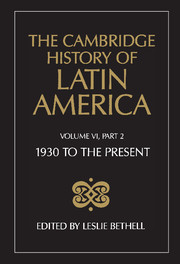9 - The Protestant churches in Latin America since 1930
from Part Four - Church
Published online by Cambridge University Press: 28 March 2008
Summary
There were in Latin America (in 1990) no less than five hundred churches, religious communities, missions and religious movements related to Protestantism. This chapter considers only those which historically and/or doctrinally trace their origins to the sixteenth-century Reformation. Following a widely accepted typology of Protestantism in Latin America we include three main streams: (a) immigrant groups, mostly European, that brought their religious affiliation and churches to Latin America; (b) missionary Protestantism: churches created by missionary work among the native populations; and (c) Pentecostalism. Omitted, therefore, are such dissident non-Protestant groups as the Jehovah Witnesses, Mormons or Christian Scientists and syncretic movements like the Rev. Sun Myung Moon’s Unification Church which, although born in areas of Protestant majority, do not claim either a Protestant origin or to belong to Protestantism.
BACKGROUND
Aside from the British colonies in the Caribbean all the attempts in the sixteenth century to found Protestant colonies in the continent (for example, the Welser German colony in Venezuela, the Huguenot colony in Rio de Janeiro and the Huguenot colony in Florida) were aborted. Twenty-seven persons were condemned during the sixteenth and seventeenth centuries by the Inquisition for ‘Lutheran heresy’. Some of these were British privateers and tradesmen and some were Spaniards influenced by Erasmian ideas and the ‘Iluminado’ movement in Spain. In the eighteenth century, with the accession to the throne of Spain of the ‘enlightened’ Bourbon dynasty, there was a greater circulation of dissident ideas and books. In an effort to eradicate them, the Inquisition identified the religious doctrines of the Reformation and the liberal political and philosophical ideas of the French Enlightenment, whereby the designation ‘Lutheran’ embraced both ‘heresy’ and ‘subversion’.
- Type
- Chapter
- Information
- The Cambridge History of Latin America , pp. 583 - 604Publisher: Cambridge University PressPrint publication year: 1995
References
- 1
- Cited by

